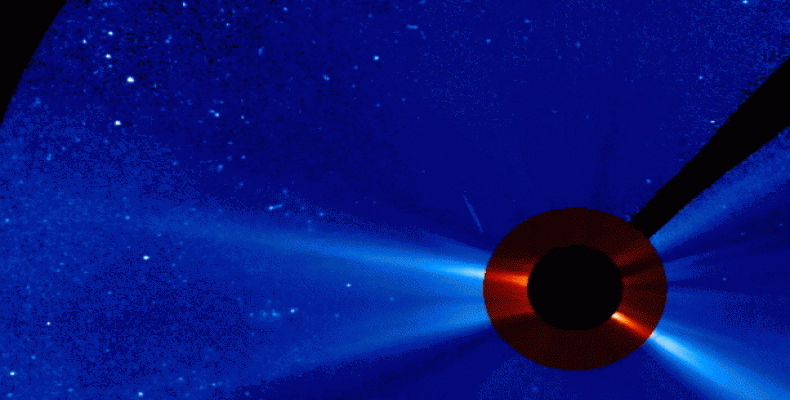Greenbelt, Maryland April 10 (RHC) The natural magnetic bubble surrounding the Earth known as the magnetosphere could be an essential part of what makes our planet habitable, according to new research investigating the impact of solar eruptions on the atmosphere of Venus published by the Journal of Geophysical Research.
Venus, which does not have a protective magnetosphere, was hit by an Interplanetary Coronal Mass Ejection (ICME) in December 2006, and the authors of the new study explained that the slow-moving solar material’s impact resulted in a significant loss of atmospheric oxygen.
Does a planet need a magnetosphere to be habitable?
According to NASA, ICMEs and other types of coronal mass ejections are larger eruptions of solar material capable of disrupting the atmosphere surrounding a planet. On Earth, the impact of these events are lessened somewhat due to the magnetosphere. Venus, though, is not so lucky.
“What if Earth didn’t have that protective magnetosphere?” pondered Glyn Collinson, a scientist at the Goddard Space Flight Center in Greenbelt, Maryland and first author on a paper published earlier this week in the Journal of Geophysical Research. “Is a magnetosphere a prerequisite for a planet to support life? The jury is still out on that, but we examine such questions by looking at planets without magnetospheres, like Venus.”
While the US space agency points out that we don’t know exactly what is essential for a planet to support biological life, the interplay between the Earth and the sun does play a critical role, and the magnetosphere is unquestionably involved in maintaining the balance between receiving the right amount of energy to support life while sheltering the planet from harsher solar emissions.
An “unimpressive” CME causes a dramatic reaction
The December 2006 incident that took place on Venus may have been slow-moving, but was nonetheless powerful enough to cause rip away what NASA refers to as “dramatic amounts” of oxygen from the planet’s atmosphere, causing it to be lost forever. Learning why a relatively small CME had such a dramatic impact could go a long way towards determining whether or not life is possible on planets without a magnetosphere.
Collinson began his work by studying data from the ESA’s Venus Express spacecraft, and found that on December 23, 2006, the world’s atmosphere leaked oxygen at one of the highest densities ever recorded. At that same time, the data also revealed something unusual occurring in the solar wind constantly passing by the planet, so he joined forces with Goddard scientist and solar wind specialist Lan Jian to investigate further, and the duo found evidence of the CME.
That CME, which originated on December 19, would have been travelling approximately 200 miles per second – a relatively slow speed by CME standards and roughly the same velocity as the solar wind itself, according to NASA. Collinson called it “fairly unimpressive” but noted that Venus itself “reacted as if it had been hit by something massive.”
New insight into the potential habitability of extra-solar planets
The effects of the CME also built up over time, the researchers added, tearing off a portion of the planet’s atmosphere and yanking it out into space. While the findings do not prove that these small eruptions will always produce similar effects, it does show that such a response is possible and appears to underline the importance of a magnetosphere in protecting a planet from space weather events of solar origin.
Venus is 10 times hotter than Earth and has an extremely thick atmosphere, and the researchers believe that vulnerabilities to solar storms could help explain why those extreme conditions exist on the planet. Whether or not that is the case, they also noted that understanding the effect that the lack of a magnetosphere has on a planet like Venus could help experts better understand the potential habitability of planets located outside our solar system.


